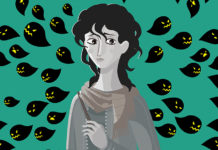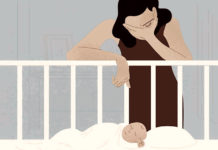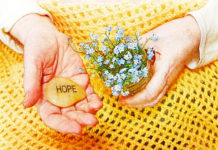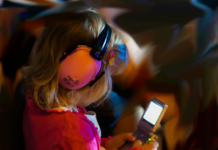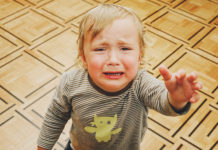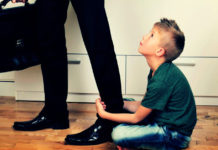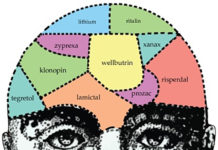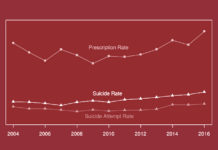U.S. Politicians Now “Trauma Informed”—Should We Be Hopeful?
It is good that the general public is finally hearing about the ACE Study, but I do not count on U.S. politicians to address the core implications of the ACE findings—the need to re-make U.S. society so as to (1) prevent preventable adverse childhood experiences, and (2) create a society in which healing from trauma can more easily occur.
Inside an Online Charter School: Labeling Kids “Disabled” for Profit
I’d thought this teaching job would be my chance to make positive changes in children’s lives. But most of the recommendations in students' IEPs were related not to reading, writing, and ’rithmetic but to behavior control and obedience to adults. And the school seemed to be working very hard to prove that the kids were disabled and to get them certified as such.
The Voices My Daughter Hears
The voices were extraordinary; in a way, they were like ghosts. I could not see them, but only divine them by the turmoil they stirred up in Annie. They were not polite house ghosts who knew when to leave; they were ne’er-do-wells she could not get rid of. They were tormentors and torturers, testing the limits of her sanity, blackmailing her into submission.
Letter to My Child’s Psychiatrist
Dear Doctor, I wonder if you remember my son... you only spent about ten minutes with him, exactly four days after his first suicide attempt. I asked you if his medication, Zoloft, had anything to do with what was happening. You looked at me and said, "There's no way of knowing; there are too many factors involved."
FDA Approves Using Electricity All Night Long on Children’s Brains
The FDA just approved sales of an electrical device called the Monarch eTNS to be used on the brains of children diagnosed with so-called ADHD. The device “sends therapeutic signals to the parts of the brain thought to be involved in ADHD,” according to the FDA press release. “Therapeutic signals”? Really?
My Son and the “Mental Health” System
As a father whose 27-year-old son is trapped in the mental health system, I am painfully aware that I have been unable to protect him. At age 19, my son naively told his mother and his doctor that he was hearing voices, marking the beginning of a hellish nightmare which he is still unavoidably immersed in. I would like to explain my perspective on why this is the case.
Lithium: A Survivor’s Guide for Parents
When I was a young adult, I was misdiagnosed with bipolar disorder and placed on lithium. I am 61 years old now, living on the edge of end-stage kidney disease. If I could undo everything, by all means, I would not have taken this drug. It is not safe for anyone at any age.
“Dad, You Were Right”: I Got Better When I Stopped Treatment
Through all the years that I was a mental patient, my parents were excellent advocates who constantly questioned what the docs were doing, even though my own faith in psychiatry was unwavering.... Amazingly, what cured me was not some type of “treatment,” but getting away from drugs and therapy.
Struggling Parents, Burdened Social Services: What We Can Change
Parents encounter many obstacles when trying to secure adequate educational, medical, psychological, and social supports for their children. These “dense bureaucracies” hurt not just families, but everyone.
“Breakthrough” Treatment for Postpartum Depression: Game Changer or Misguided Magic Bullet?
Ultimately, the FDA Advisory Committee recommended approval of brexanolone by a 17-1 member vote. I was the only NO vote. I voted NO because as the sole Consumer Representative on the committee I didn’t believe the company had demonstrated that the potential benefits outweighed the potential for harm.
Where Can Families Turn for Help?
Watching my son be subjected to continuous harm by the drugs, how can I pretend that it's okay to maintain this abusive system of care? Who will push for accountability? As a mother, I want to share a meaningful connection with my son. I want to witness him happy, healthy and living the life he chooses.
Student Counseling Services: Do They Really Help the ‘Mentally Ill’?
I used to think that the counseling center would help me to resolve my inner conflicts. That visiting the center would do some good for me. I have since realized that most mainstream “mental health” is more damaging than helpful. These days if student counselors see any problem with a student visiting the center, they send him or her to see a psychiatrist.
Kick Big Pharma Out of the Classroom
School-based strategies such as the “talk to your doctor” campaign about any childhood problem have been extremely effective in helping the pharmaceutical industry to marginalize traditional child-rearing practices and replace them with advice from mental health “experts” and the use of dangerous drugs. These campaigns are reminiscent of now-illegal vintage tobacco ads in which doctors endorsed cigarette smoking.
How “Mental Health Awareness” Exploits Schoolchildren
Imagine being a parent at a meeting with educators to discuss Johnny's academics or behavior. Suddenly, your child’s teacher is telling you that he needs to see a doctor for an assessment of a suspected “mental disorder,” which usually leads to a prescription for medication. Warned of “the risks against failing to intervene,” you will likely acquiesce.
7 Tips to Help a Distracted Child
Simple changes such as keeping a calm home environment, limiting media distractions and enrolling your child in sports will help a child who is inattentive or having problems focusing on his or her school work. They are also useful for any child and can even prevent inattentiveness in an ever-more-distracting world.
7 Tasks for a Parent Whose Child Is Diagnosed with a Mental Illness
When I teach workshops or lead discussions on coming off psychiatric drugs and alternatives, there are invariably parents present who are at loose ends. They want to know how best to help their children, and how it can be possible for their child to live without medication. Here are seven ideas I share with them that may also help you.
Childhood Bipolar Disorder, Deconstructed
Diagnosing children with juvenile or pediatric bipolar disorder is largely an American phenomenon. Do we actually have more “bipolar” children in the United States—or are we simply labeling more of them as such? If it is ever fair to call a child “manic,” isn’t the child’s environment the direction in which we should look?
Why My Daughter Died and I Lived
To be a parent of a suicidal child is to be in a terrible position, where you hold in your hands the life most valuable to you and know that any slip of your hands may end that life. In the 1970s, my suicidality was treated nonmedically and I lived. In the 2000s, my daughter Martha’s suicidality was treated medically and she died.
Invisible Trauma: The Children Left Behind When Parents Are Hospitalized
It would take decades before I recognized the trauma caused by repeatedly being separated from my mom when she was hospitalized. I grieved almost exactly the way children did who had lost a parent to death. Yet it was grief without closure because my mom was not dead, just... gone.
The Real Attention Deficit Disorder
The fact that we shame people for acting like they need attention (and for actually needing attention) is self-defeating and maddening, not to mention absurd. Living in a society that punishes people for having fundamental needs like attention is probably one of the reasons people have developed behaviors “just” to “get attention.”
MIA Update: Our Parent Resources Initiative and More
Regular MIA readers may have noticed that we recently added a content box on the front page titled “Parent Resources.” This initiative has been a long time coming, and it is one that we hope will help us reach—and serve—a new group of readers. Many parents writing to us are desperately looking for a way out of the conventional system.
Memoirs of a Dissident Psychiatrist
For years I had hoped that psychiatry would free itself from the psychoanalytic doctrine, and when my wish finally came true, my profession went from the frying pan to the fire. My main goal, currently, is to convince professionals as well as the public that most child psychiatric problems can be handled effectively without medication.
Adolescent Suicide and The Black Box Warning: STAT Gets It All Wrong
STAT recently published an opinion piece arguing that the black box warning on antidepressants has led to an increase in adolescent suicide.
It is easily debunked, and reveals once again how our society is regularly misled about research findings related to psychiatric drugs. STAT has lent its good name to a false story that, unfortunately, will resonate loudly with the public.
Suicides Are Increasing – And So Are Antidepressant Prescriptions
Disturbingly, our study and others reveal that the black box warning is now ignored in many countries, since antidepressant prescriptions for children are on the rise again. Despite increasing certainty that antidepressants are ineffective and likely cause suicidal behavior in young people, psychiatry continues to claim that they reduce suicide risk.
A Time For Rain: Teaching Our Children About Sadness
The only way out of the epidemic of feeling-people-turned-medicated-psychiatric-patients is to rebrand and reframe feeling as a cultural collective. And I believe it starts with our messaging as parents and our orientation toward shadow elements like anger and sadness. We have to model a conscious relationship to our own dark parts, and we have to show our children what it looks like to move through these spaces. Feelings can be messy, wild, and sometimes ugly to our constrained sensibilities.



